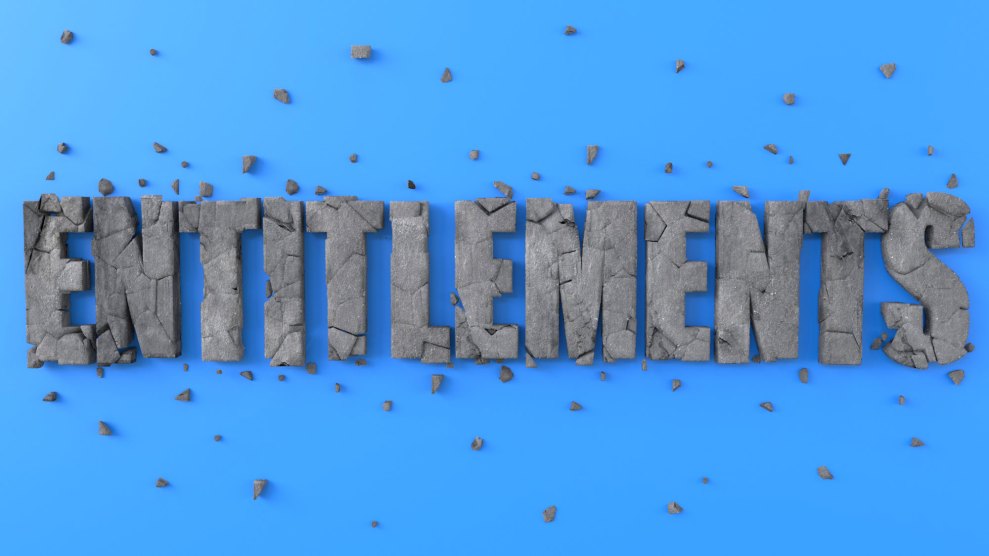
Mother Jones illustration; Andrew Harnik/AP; Ron Sachs/CNP/ZUMA
I am still suffering from Trump-era-induced brain melt. But even against the uncontrolled spigot of dumb that produced my malady, one especially dumb moment stands out: former President Donald Trump’s peek at a solar eclipse.
As I wrote at the time, it was a deeply Trumpian incident that, true to character, defied both science and common sense from the literal highest perch of government, the White House. But returning to this moment seven years later, a strange tingling connection emerges—and I can’t help but relate. There’s something understandable about the stupid curiosity with which he ignored the rules for a fleeting second. The thrill! (But I speak as someone who touched a painting on a dare during a school trip to the Metropolitan Museum of Art.)
So on the eve of another total eclipse, I talked to Dr. Viola Kanevsky, a renowned optometrist based in New York, to ensure that I had the facts straight on what the eyes can take, should my own mischief lead me to suffer a very different kind of melt.
Here’s what she had to tell me about the potential for eye damage—and Trump’s infamous 2017 turn toward the sun.
What one safety measure would you want people to be aware of during Monday’s solar eclipse?
Ideally, you have a pair of solar eclipse glasses. You could also go online and learn how to create a pinhole camera so that you view the eclipse indirectly. But if you want to view the eclipse directly, you really need an approved pair of glasses.
The main piece of advice I have is for people not to look at it directly, especially: vulnerable people, like young children; people who have lighter eyes; or people who have had cataract surgery recently. Normally, if you look at the sun, you would either sneeze or close your eyes. When there is an eclipse, especially before it’s partially obstructed, it’s not bright enough to force you to close your eyes. But it is still intense enough to cause permanent retinal damage.
Take me through what scientifically happens to the eye when it looks at an eclipse. Does the eye really burn off? And if so, what does that feel like?
Unfortunately, retina damage feels like nothing. If you pinch your skin, you have receptors that cause pain, and you feel pain. But if you burn or tear the retina, you might see flashing lights, but it’s a painless event.
The damage doesn’t begin to manifest until hours or sometimes even days later. The light damages the retinal pigment epithelium with the retina, which causes swelling of the retinal layers and releases free radicals that continue to damage the retina as time goes on. So it’s continued the damage continues beyond the exposure time. The result of that is reduced acuity, distortion of the vision, a blind spot. You can get any of those symptoms. Any of these should prompt you to go to your doctor of optometry and get it checked out right away.
So to be clear. Exactly how soon after exposure do these symptoms appear?
It can start anywhere from an hour to a week after the exposure that you start to see the signs.
Are we talking about permanent damage?
Often it is permanent damage. If it’s very brief and very mild exposure, most cases will resolve within about six weeks, meaning you’ll get back your vision. But often the metamorphosis that accompanies it, which is that waviness, a distortion of the vision that sometimes remains permanently.
I have patients who have had solar burns or solar holes that have 20/40, 20/80, or sometimes even worse vision—and permanently. But worse than that is a blind spot in the central vision, which means that they’re actually missing an image right smack in the middle of their vision.
Are there procedures that undo that damage?
Unfortunately no. We’ve tried things like steroid treatments, but the best treatment is prevention.
So in talking about all this, Donald Trump’s peak at the sun comes to mind. What were your initial thoughts after seeing the President of the United States ignoring the warning to not look?
It was unfortunate. Of course, I don’t know his ocular history. But it sets a poor example, especially for people who don’t know and don’t have the information, like young children, who might then want to do the same. They were made vulnerable.
Trump looked at the eclipse in 2017. It’s now seven years later. So while many things might be off about him, his vision does seem intact.
Well, how would I know? I haven’t checked his eyes. There is no way to look at someone and know that they only have 20/40 vision or a blind spot in one eye. And, at his age, you should be wearing reading glasses all the time instead of squinting. He’s not doing that either.
Any advice for him for this upcoming eclipse?
I tend to not give people vision advice. But what I would advise anyone to do at any age is make sure that they’re getting a checkup every year to make sure their eyes are healthy. Certainly, as people get older, to make sure that their eyes are healthy to rule out signs of conditions like glaucoma, macular degeneration, and cataracts—things that are preventable and treatable.
Ok, amazing. Anything else we should know?
The only other suggestion I have for kids is to read A Connecticut Yankee in King Arthur’s Court by Mark Twain. There’s an eclipse in there, and knowing the date of the eclipse manages to save someone’s life. It’s a fun story.

















